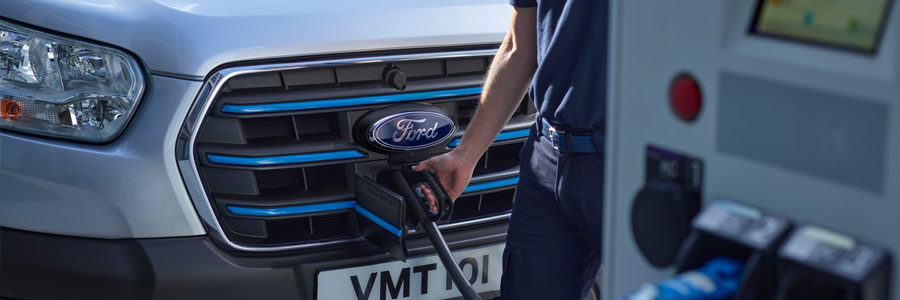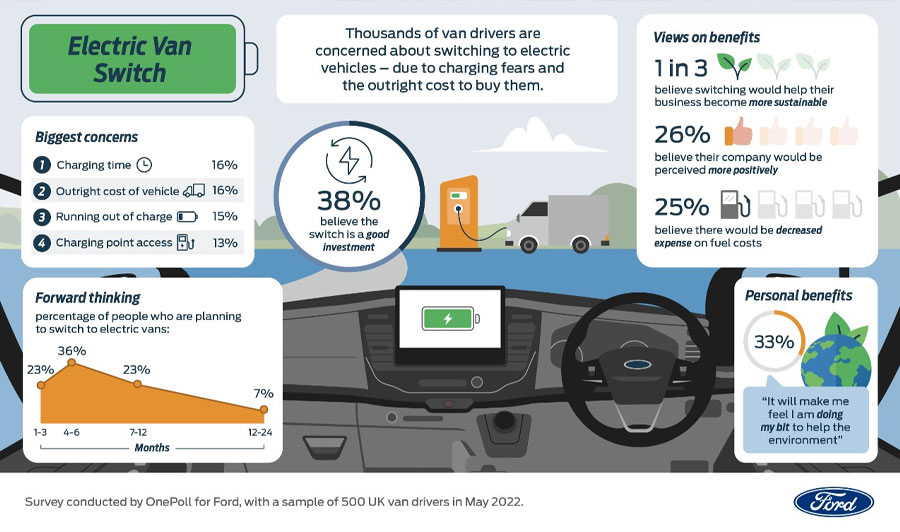Van drivers worry about being out of pocket over charging costs

Van drivers are currently underestimating the range of electric vans, and many are worried that they will be out of pocket for charging costs on company-owned vehicles.
Ford's latest Go Electric report has found that, despite electric vehicles becoming increasingly commonplace on the road, knowledge on electric vans is lagging behind that of cars.
With loads altering driving ranges significantly, van drivers surveyed reckon that the average range for electric models is less than 70 miles.
Issues stemming from this include time management pressures, with almost half of those surveyed believing they wouldn't be able to fit in charging times around their work and delivery schedules.
This could be exacerbated by a belief that lack of workplace charges is an issue, while more than half don't have access to a charge point at home. As well as that, more than 40% of van drivers didn't know how to charge an electric van.
Seven out of 10 drivers surveyed were concerned about being left out of pocket with an electric van, unsure of how they would be reimbursed for electric costs when charging at home.
This is against a backdrop of increasing numbers of electric vans hitting the road as companies look to transition to a greener fleet, and switch to electric vehicles ahead of the 2030 ban on the sale of new internal combustion powered vans.

The questions aren't just being asked by drivers, but by fleet operators too. The Association of Fleet Professionals (AFP) discussed the complex issues at its annual conference earlier this year.
The main topic was how to tackle the infrastructure required to make the switch to electric vans, including home or depot charging, and how to include recharging during the day if required.
“You need to de-risk the process and recognise the transition process. So it's important to optimise the infrastructure build at the lowest cost possible. Much of the sum spent is under the ground - such as trenches and substations - so make sure what you put down is correct. Because you don't want to keep digging up your depots and causing disruption to your operations because your initial plans were out.”
Alex Potts, Head of Sales at bp pulse
Although depot charging is undoubtedly an important factor in fleet infrastructure, easily controlled by the business, it is unlikely to cover all charging requirements.
“The upfront cost of a home charge point can be expensive, but allowing drivers to charge at home will pay for itself sooner than most people think.
"Factoring in downtime, on average a home charger pays for itself after 5,000 miles, and thereafter you'll be saving around £170 for every 1,000 miles by charging at home, as opposed to charging in public.
“Not only that, it's where drivers want to charge. We've heard stories of drivers sitting in car parks late at night because that's the only way for them to charge their vehicles. If businesses get their EV strategies wrong, they will lose drivers to competitors that get it right. We've seen this happen. Businesses need to consider what's best for their drivers.”
Ashley Tate, CEO of EV charging solution provider Mina
Education is an important factor according to the AFP, with chair Paul Hollick saying:
“In terms of the EV transition, we are seeing a lot of attention given to public charging – to whether it can be easily accessed, its costs, compatibility with apps and so on – but comparatively little is being said about home charging.
“However, we are hearing from our members that drivers often don't know much about home charging beyond how to connect their vehicle. It does seem to be an area where parties such as employers, manufacturers, charging providers and organisations such as the AFP need to fill the gap. Simply, knowing a few basics will help drivers to get the most out of their electric car or van, as well as keeping costs low.”
Mandy Dean, Commercial Vehicle Director, Ford of Britain, adds:
“With the Ford Transit being the best-selling vehicle in the UK, tackling the concerns of Britain's workforce is an important task in helping the nation go green and make the switch to electric. Understanding people's perceptions of electric vehicles is vital to making sure we're all on board, including within the vital commercial vehicle segment which is so important for keeping the UK's economy growing.”
View our latest blog posts

Categories
Pages
We are a family run business based in rural Worcestershire. Our team of 38 staff are on hand to provide an exceptional service to personal and business customers.
Read More
